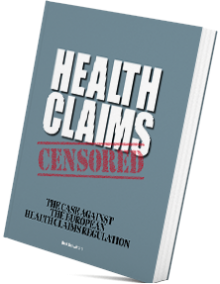On the 14th of July 2016, the European Court of Justice determined that the European Nutrition and Health Claims Regulation (NHCR) applies to “nutrition and health claims made in a commercial communication on a food which is intended to be delivered as such to the final consumer, if that communication is not addressed to the final consumer, but exclusively to health professionals.” [i]
Must we now put ashes on our heads and tear our robes ? Hell no !!! You see, the flip side of this imperial coin sheds a bright light on the fact that the NHCR does NOT apply to health claims as such. It applies, so confirms the Court, exclusively to health claims used incommercial communication. Health claims that are made outside a commercial communication, such as an advertisement, a label or other kind of commercial presentation, are not subject to the restrictions laid down in the NHCR and “allied” regulations and terms of reference.
It is the commercial context that activates the NHCR.
In the NHCR, the term “health claim” is defined as “any claim that states, suggests or implies that a relationship exists between a food category, a food or one of its constituents and health.” This definition includes “reduction of disease risk claims,” which are defined as “any health claim that states, suggests or implies that the consumption of a food category, a food or one of its constituents significantly reduces a risk factor in the development of a human disease.”
Health claims are non-commercial per se
The Court’s Judgment also brings to light that claims concerning a relationship between a food category, a food or one of its constituents and health are non-commercial statements per se. In the NHCR, the European legislature qualified them as the non-commercial (“public”) elements in commercial communication and accordingly, it evaluates, rejects or authorizes and administrates them as such. There is no reason to assume that health claims used outside commercial communication would somehow lose their non-commercial character and become commercial statements.
Indeed, in Recital 4 of the NHCR, the legislature confirms that the Regulation “should not apply to claims which are made in non-commercial communications, such as dietary guidelines or advice issued by public health authorities and bodies, or non-commercial communications and information in the press and in scientific publications.” It is the character of the communication that matters, not the health claims used in it. In its Judgment, the Court confirmed that in a non-commercial context, health claims remain just as non-commercial as when used in a commercial context. [ii]
A problematic remark
While referring to the NHCR’s Recital 4, the Court makes a rather equivocal remark. It states that, “[c]onsequently, that regulation [NHCR] does not preclude the objective information for health professionals about new scientific developments, involving the use of a technical or scientific terminology, in the situation where the communication is of a non-commercial nature.” [iii] This is an overly complicated and confusing way of confirming that the NHCR does not apply to health claims used in non-commercial communication.
The remark is problematic, because it is not so that the Regulation does not apply, as the Court seems to suggest, on condition that the information is “objective.” It doesn’t apply either when the information is subjective. It doesn’t apply when the information concerns “new scientific developments, involving the use of a technical or scientific terminology.” It doesn’t apply either when the information concerns well-established and well-known scientific developments, involving the use of non-technical or non-scientific terminology. In fact, the NHCR never precludes or permits a health claim that is used in non-commercial communication. It simply doesn’t apply at all.
Yet, it is as if the Court wants to infer or imply that outside the scope of the NHCR only non-commercial sources are capable of producing objective information and that information is objective only when it is non-commercial. This equivocality stems from the dubious wording of Recital 4, which could easily be misread as meaning that only public health authorities and bodies, the press and scientific authors could be sources of “objective” and therefore “non-commercial” communications and that therefore, i.e. because of the non-commercial character of a claim’s author, health claims used by such sources would be off-limits for the NHCR.
The NHCR delimits EU’s competences
Such an interpretation turns the NHCR on its head. The scope of the NHCR is delimited to health claims used in commercial communication. This means that health claims used in non-commercial communication are beyond the Regulation’s perimeters. The NHCR is not an invitation for the courts or authorities to tresspass these perimeters and make speculations, suggestions or inferences as to who is and who isn’t allowed to use health claims outside the NHCR’s scope.
The NHCR delimits the relevant competences of the European legislature. It does not delimit or define competences of anyone else using health claims in a non-commercial setting. In the NHCR, the European Union delimited its own competences and field of operation. The regulatory design of the NHCR prohibits the application of the criteria set for health claims used in commercial communication to health claims used in non-commercial communication.
In fact, by focusing the scope of the NHCR exclusively on the commercial context in which a health claim is used, the legislature implicitly but clearly acknowledged that a health claim used as such, i.e. without being embedded in a commercial or non-commercial context, is off-limits for the NHCR. When food business operators communicate a “naked” health claim, being a claim and nothing but a claim about the relationship between a food product and health, they operate outside the scope of the NHCR, because that Regulation characterizes health claims as non-commercial information. In this case, the NHCRprotects them against interference by authorities and plaintiffs.
“Naked” health claims may present benefits
Food business operators who want to use the NHCR to protect a “naked” health claim against undesirable interference, must carefully and methodically avoid inserting in it a direct or indirect commercial proposition, inviting or somehow inducing or recommending the reader to proceed to the actual purchase of the food product that produces the health benefit. Likewise, they must avoid that the claim in question is directly or indirectly connected to commercial information concerning the nutritional agent mentioned in the health claim. Such a connection would inevitably bring the claim within the scope of the NHCR and expose it to the extraordinary criteria that prohibit the disclosure of truthful nutrient-health relationship claims based on traditional use and/or backed by credible scientific evidence regardless of the (in)conclusiveness of that evidence.
In its Judgment, the Court cites the legal definition of “commercial communication,” as “any form of communication designed to promote, directly or indirectly, the goods, services or image of an undertaking, organisation or person engaged in commercial, industrial or craft activity […].” [iv] This cannot be interpreted, however, as meaning that presenting the relationship between the food and an aspect of health as beneficial should be regarded as “promotional.”
In Recital 14 of the NHCR, the Union legislature stated that “[i]t is necessary to ensure that the substances for which a claim is made have been shown to have a beneficial nutritional or physiological effect.” Which means that, according to the Union, qualifying the relationship as beneficial does not change or influence the non-commercial character of health claims. Per the NHCR, a beneficial effect is not regarded as a promotional element in a health claim.
In and of itself, the fact that a food business operator is at the origin of a “naked” health claim doesn’t turn the health claim into a commercial statement. The legal definition of “health claim” laid down by the European legislature in the NHCR prohibits that the inherent non-commercial character of the information is made dependent on its author, publisher or user. A health claim never becomes commercial, not even when it is used in a commercial context.
Food-products may be mentioned
Neither does the NHCR preclude the mentioning of the food-product that produces the claimed health benefit in a “naked” health claim. Article 1.2 of the Regulation provides that it “shall apply to nutrition and health claims made in commercial communications, whether in the labelling, presentation or advertising of foods to be delivered as such to the final consumer.” This provision is not to be read backwards as possibly meaning that the mentioning of a finished product that is to be delivered as such to the final consumer would turn a “naked” health claim into a commercial communication. The “final consumer” is defined as “the ultimate consumer of a foodstuff who will not use the food as part of any food business operation or activity.” [v]
In Article 2.1(a) of the NHCR, the legislature determined that for the purposes of this Regulation, “food” mentioned in a health claim shall be defined as “any substance or product, whether processed, partially processed or unprocessed, intended to be, or reasonably expected to be ingested by humans.” The definition includes drink and chewing gum. The definition of “food supplement” set out in Directive 2002/46/EC shall apply as well. That’s why, in health claims, one may refer to “foodstuffs […] which are concentrated sources of nutrients or other substances with a nutritional or physiological effect, alone or in combination, marketed in dose form, namely forms such as capsules, pastilles, tablets, pills and other similar forms, sachets of powder, ampoules of liquids, drop dispensing bottles, and other similar forms of liquids and powders designed to be taken in measured small unit quantities.” (emphases added)
“Naked” health claims under Freedom of Expression
With “naked” health claims, we’re in the field of information the purpose of which is no other than to inform. This is the kind of information that is protected under the principle of the freedom of expression. Not that this freedom gives anyone the right to say “n’importe quoi.” The European Convention for the Protection of Human Rights and Fundamental Freedoms provides that the exercise of this freedom, “since it carries with it duties and responsibilities, may be subject to such formalities, conditions, restrictions or penalties as are prescribed by law and are necessary in a democratic society, in the interests of national security, territorial integrity or public safety, for the prevention of disorder or crime, for the protection of health or morals, for the protection of the reputation or rights of others, for preventing the disclosure of information received in confidence, or for maintaining the authority and impartiality of the judiciary.” (emphasis added) [vi]
When consumers receive and read “naked” claims, they also exercise the aforementioned fundamental freedom that provides that “this right shall include freedom to hold opinions and to receive and impart information and ideas without interference by public authority and regardless of frontiers.” (emphasis added) In this situation, the recipients of information are not hindered by the protective measures that the European Union has erected around potential consumers-as-purchasers. That kind of protection sets in only when information becomes – part of – commercial communication, i.e. when consumers are invited to become purchasers.
Protection of health off-limits for EU
But even if there would arise a need for “public authority” to interfere with the freedom of expression for reasons of the protection of health, Article 168 of the Treaty on European Union prohibits that such interference shall have the form of European formalities, conditions, restrictions or penalties as are prescribed by law. The protection of public and private health is not a competence that was delegated to the European Union. [vii] The Member States reserved for themselves the competence to act in the field of public health.
To lay its hands on health claims nevertheless, the European legislature needed a commercial – consumer/purchaser protection – context. Without that commercial context, health claims remain within the scope of public and private health, an area that is off-limits for the EU legislature. This is why the NHCR does not regulate “naked” health claims, but, “an increasing number of foods labelled and advertised in the Community bear[ing] nutrition and health claims.” [viii] The harmonizing intervention concerns “differences between national provisions relating to such claims [that] may impede the free movement of foods and create unequal conditions of competition.” [ix] “Naked” claims may enter free circulation throughout the European Union without any impediment raised by European or national authorities.
Facilitating consumers’ choices
The purpose of the “naked” health claim is to provide health information and education in order to facilitate consumers’ dietary choices. Since facilitating these choices may very well influence the readers’ health, the maker of the claim has the moral duty to provide truthful and non-misleading information. His information shall not endanger or compromise the readers’ health. Lending insights from the European Court of Justice’s case law, the information must be objective and it must reflect “toute la réalité.” [x]
After all, if the information would be correct but incomplete, the accidentally or intentionally omitted information could shed a completely different light on the part of the information provided, so that the reader might be misled. A similar provision can be found in the procedure that must be followed by applicants who present health claims to the European Union for use in commercial communication. [xi]
So, dear food business operators, do not cover your heads with ashes and do not tear your robes. Go “naked” with your health claims and facilitate your readers’ dietary choices by providing them the information that is getting lost in commercial communication.
Bert Schwitters
[i] Judgment of the Court (Third Chamber) of 14 July 2016 in Case C-19/15, Request for a preliminary ruling under Article 267 TFEU from the Landgericht München I (Regional Court, Munich I, Germany), made by decision of 16 December 2014, received at the Court on 19 January 2015, in the proceedings
Verband Sozialer Wettbewerb eV v Innova Vital GmbH.
[ii] Paragraph 52 of the C-19/15 Judgment.
[iii] Paragraph 53 of the C-19/15 Judgment.
[iv] Article 4.12 in Directive 2006/123/EC and Article 2(f) in Directive2000/31/EC.
[v] Article 2.1(a) of the NHCR.
[vi] Article 10 of the European Convention for the Protection of Human Rights.
[vii] Per Article 168 of the Treaty on European Union, the Member States did not confer upon the Union to harmonize different national laws, provisions or regulations in the field of public health.
[viii] Recital 1 of the NHCR.
[iv] Recital 2 of the NHCR.
[x] Advocate General Jean Mischo remarked in his Opinion (“Conclusions”) in the “Gut Springenheide” Case C-210/96.
[xi] See e.g. Technical rules for the preparation and presentation of the application for health claims in Commission Regulation (EC) No 353/2008 of 18 April 2008 establishing implementing rules for applications for authorisation of health claims as provided for in Article 15 of Regulation (EC) No 1924/2006 of the European Parliament and of the Council.




